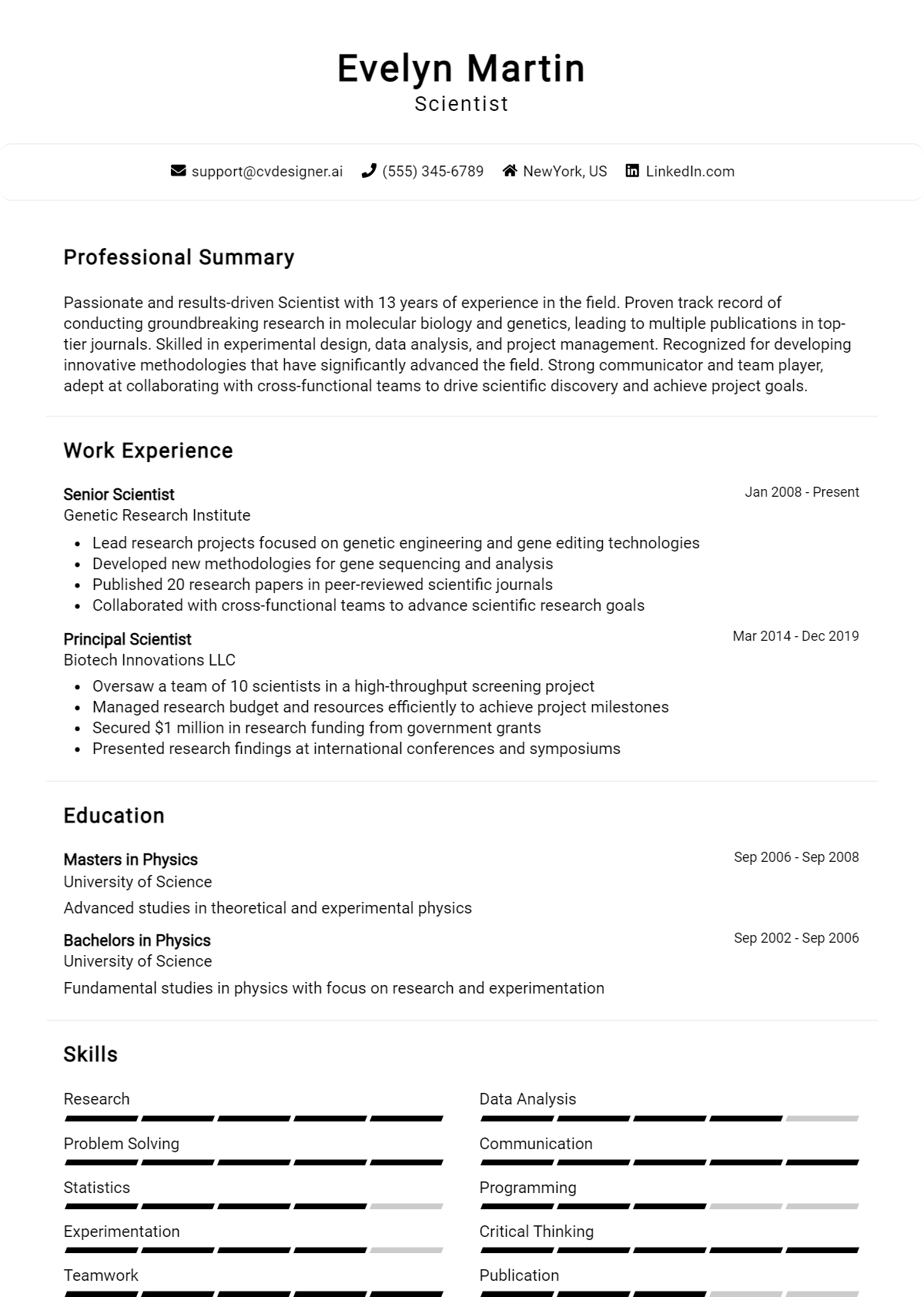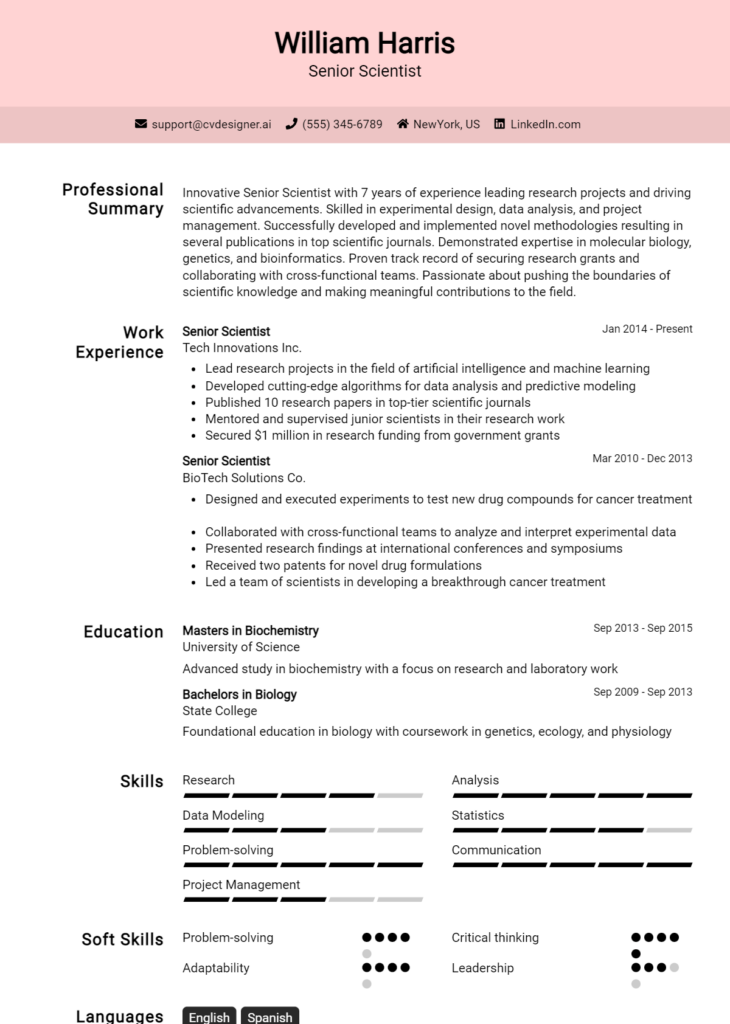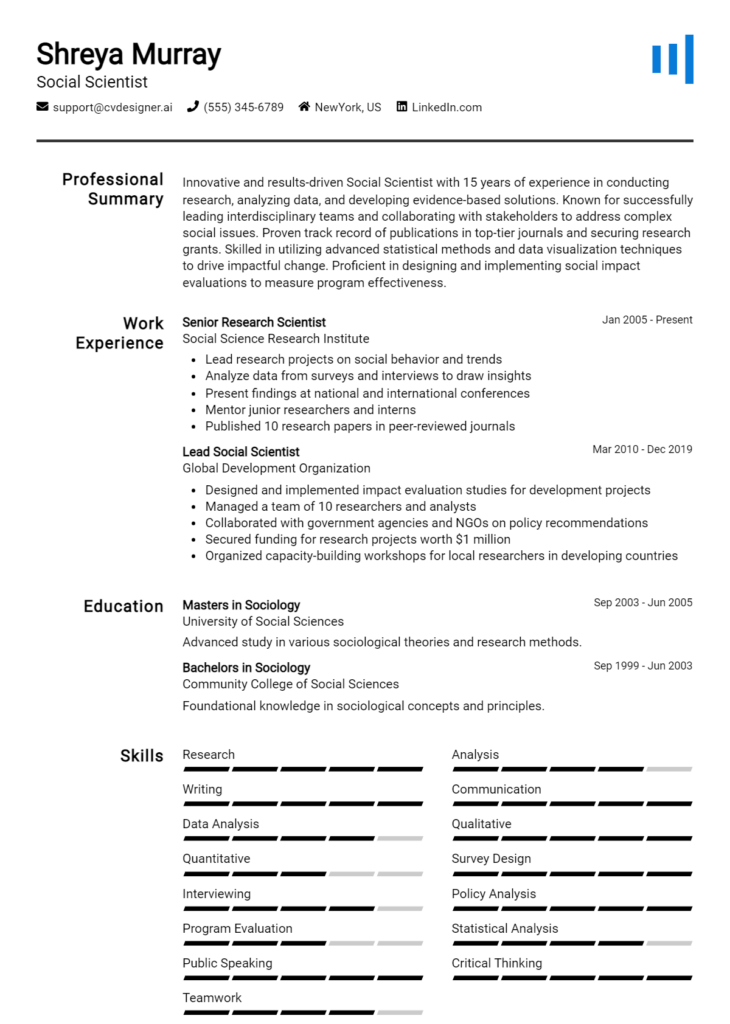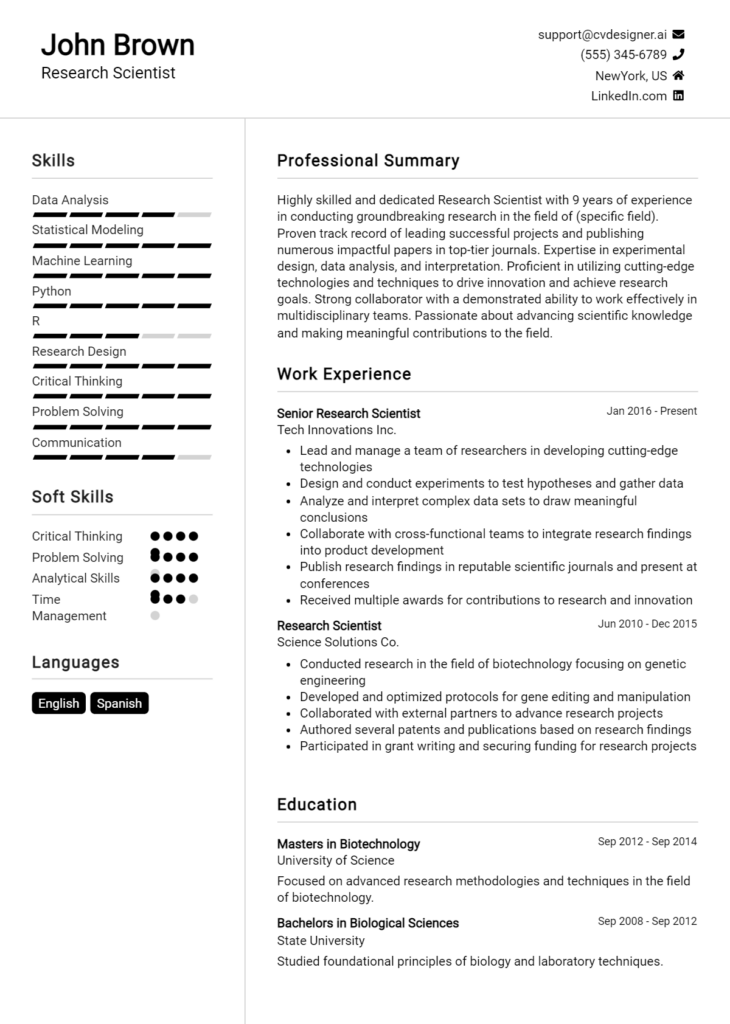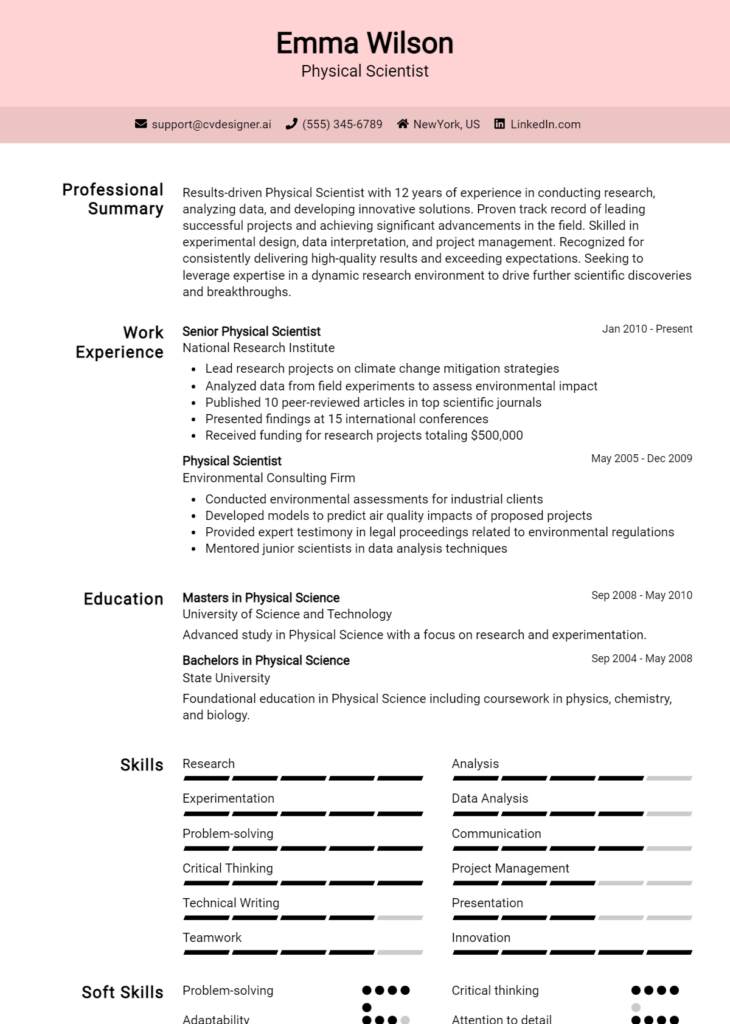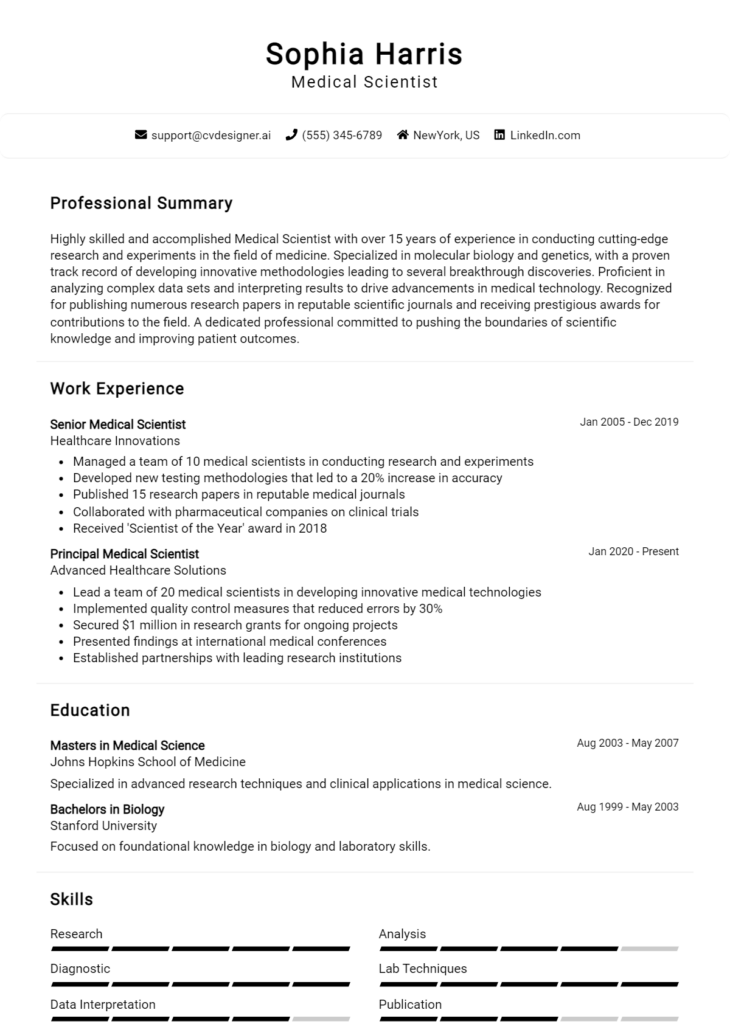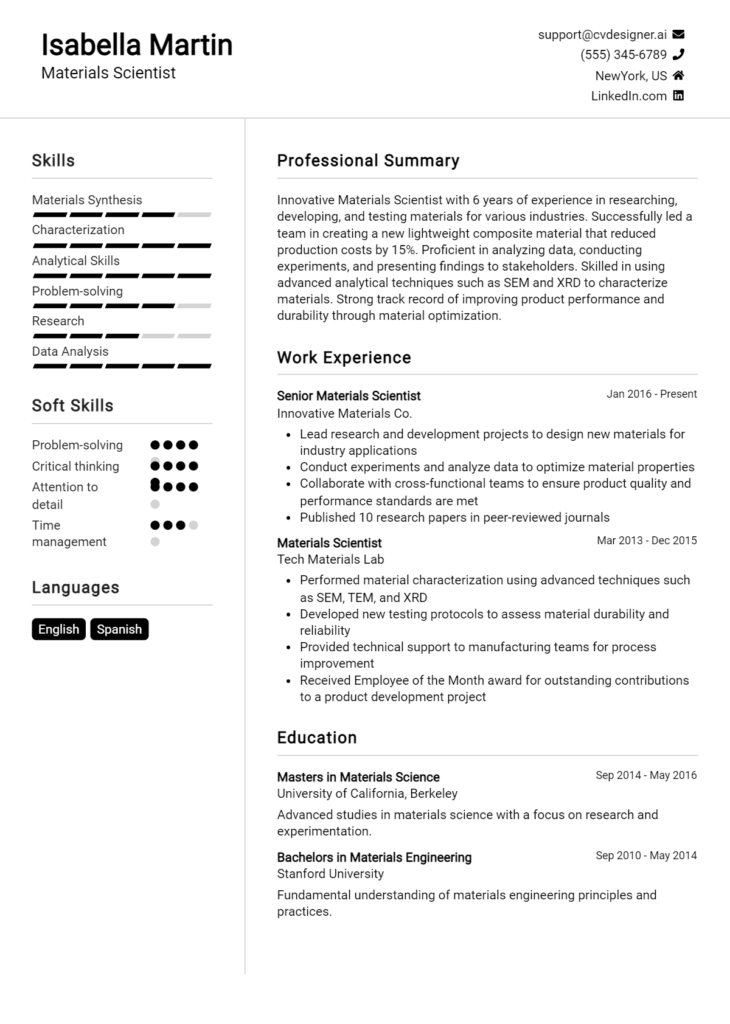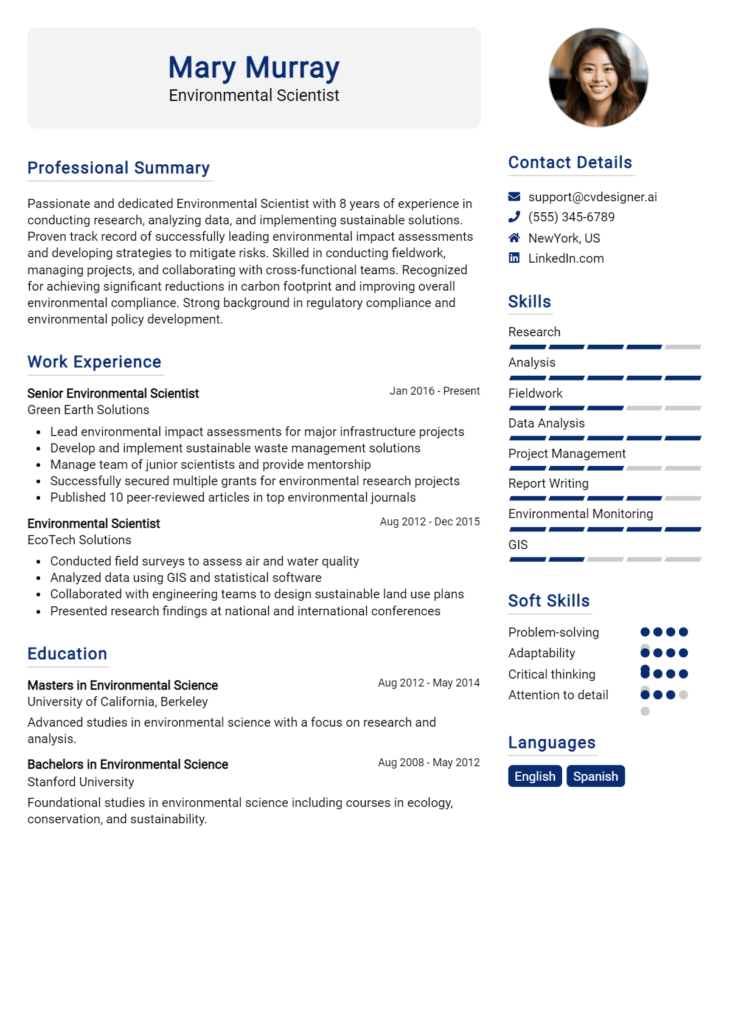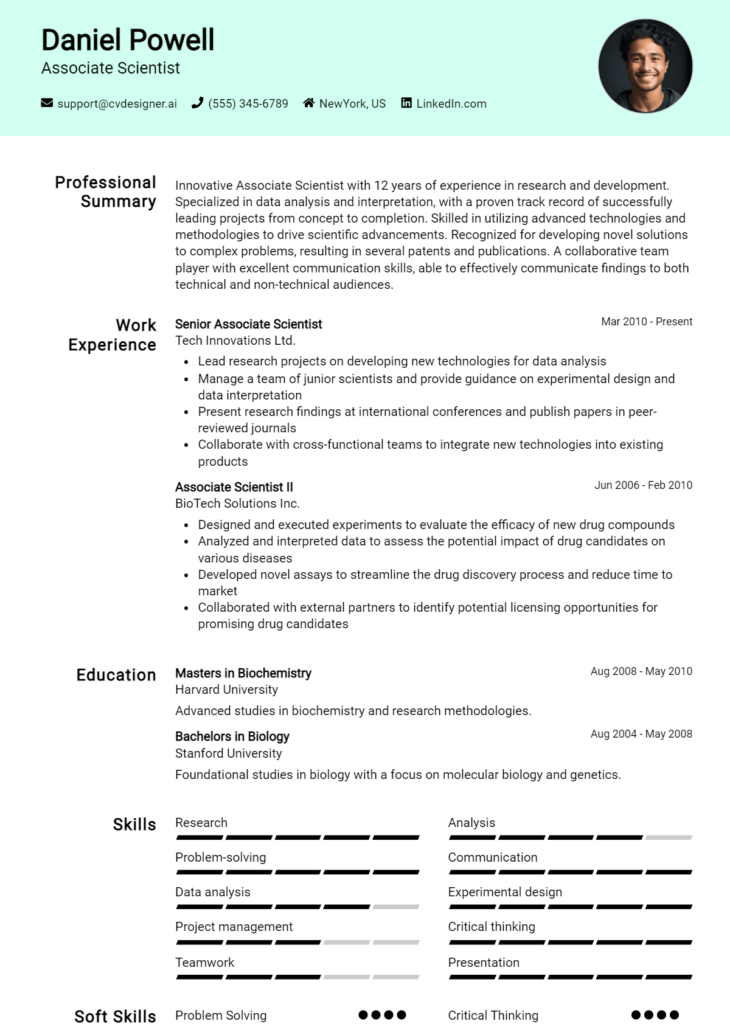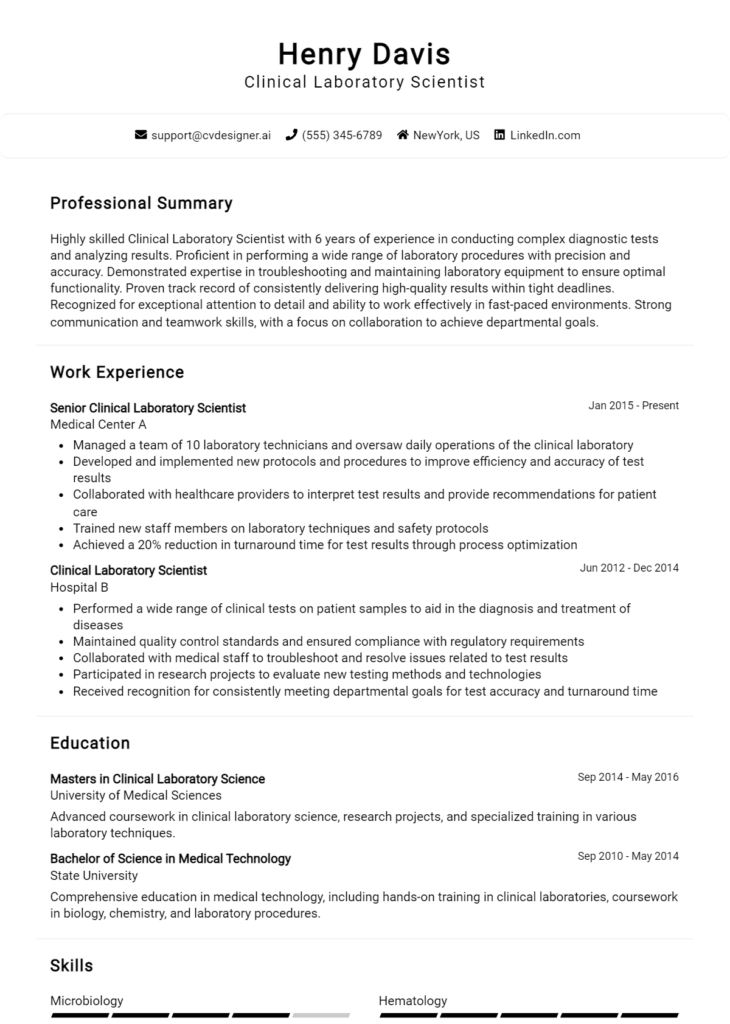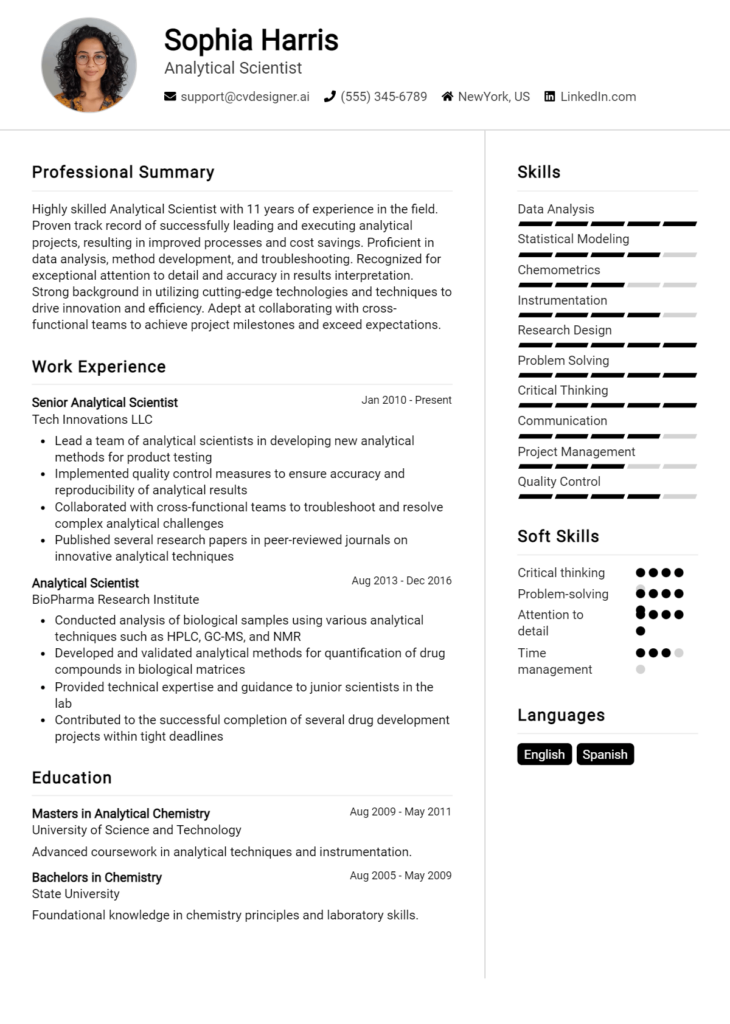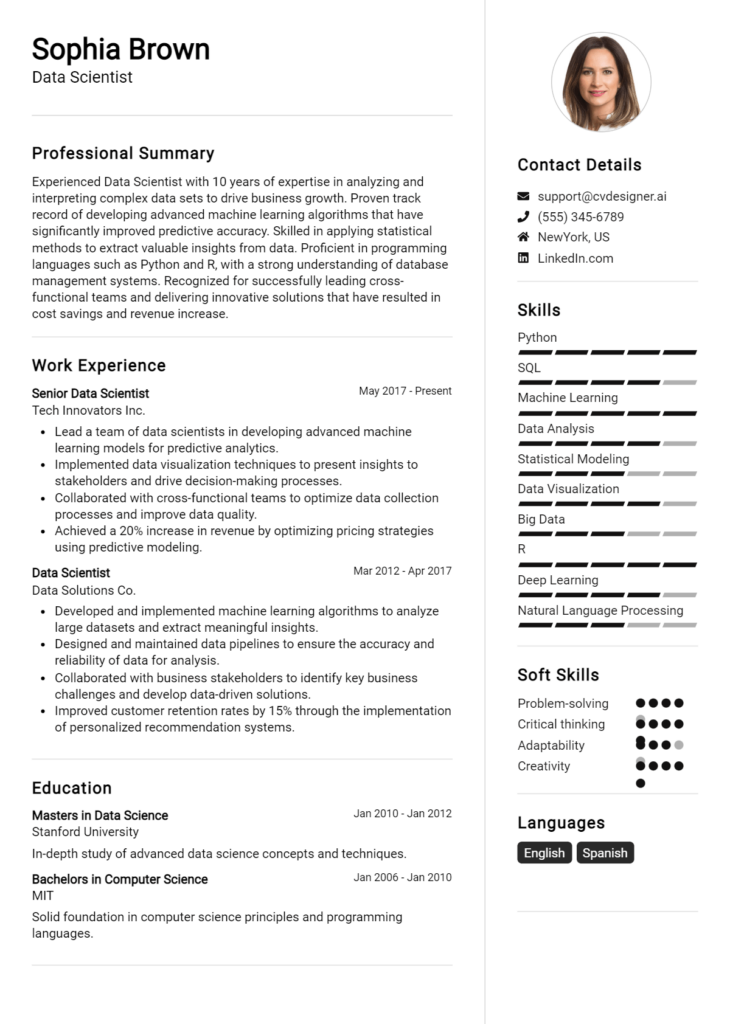Most Popular Scientist Resume Examples
Explore additional Scientist resume samples and guides and see what works for your level of experience or role.
As a scientist, you stand at the forefront of innovation and discovery, contributing to advancements that shape our world and improve lives. Your expertise can lead to groundbreaking research, new technologies, and solutions to pressing global challenges. However, to secure the position that allows you to make an impact, you need a compelling resume that showcases your unique skills and experiences. A well-crafted resume not only highlights your qualifications but also differentiates you from other candidates in a competitive job market. This article serves as your comprehensive guide to writing an effective scientist resume, complete with practical examples that cater to varying levels of experience.
In the following sections, we’ll delve into the essential responsibilities and skills that should be highlighted in your resume, as well as the best formats to use for optimal presentation. You’ll learn about common mistakes to avoid that could undermine your application, and we’ll provide tailored resume examples that cater to scientists at all stages of their careers. Additionally, we’ll share valuable tips on crafting a standout resume and selecting the right resume templates that resonate with hiring managers in the scientific community. Whether you’re just starting out or are a seasoned professional, this guide will equip you with the insights you need to create a resume that truly reflects your potential.
Key Responsibilities and Skills for a Scientist
As a Scientist, your primary role involves conducting research to advance knowledge in your field, whether it be biology, chemistry, physics, or any other scientific discipline. You will be responsible for designing experiments, collecting and analyzing data, and interpreting results to draw meaningful conclusions. Collaboration with other scientists and professionals is often essential, as is the ability to communicate findings effectively to a variety of audiences.
Key Responsibilities:
- Design and conduct experiments to test hypotheses.
- Collect, analyze, and interpret data using statistical tools and software.
- Prepare and present research findings in written reports and oral presentations.
- Collaborate with interdisciplinary teams on research projects.
- Stay current with advancements in the field through continuous learning and professional development.
- Ensure compliance with safety and regulatory standards during experiments.
Essential Skills:
- Strong analytical and critical thinking skills.
- Proficiency in laboratory techniques and instrumentation.
- Excellent written and verbal communication skills.
- Ability to work collaboratively in a team environment.
- Proficient in data analysis software (e.g., MATLAB, R, Python).
- Strong problem-solving abilities and creativity.
Highlighting these skills effectively in your resume is crucial, as they demonstrate your qualifications and fit for the position. Tailoring these responsibilities and skills to align with the specific job description can significantly improve your chances of being noticed by potential employers. Additionally, consider how these skills can be relevant in crafting a strong CV, showcasing not only your technical expertise but also your ability to contribute to the scientific community.
Best Resume Format and Structure for a Scientist
When creating a resume for a scientist position, it’s essential to choose a format that highlights your qualifications, skills, and experiences in a clear and professional manner. Here’s a detailed guide on the best resume format and structure for a scientist:
Contact Information
- Your Name: Use a larger font size for your name to make it stand out.
- Phone Number: Include a direct number where you can be reached.
- Email Address: Use a professional email address.
- LinkedIn Profile or Personal Website: If applicable, include links to your professional profiles or any relevant online portfolio.
Professional Summary
- Concise Overview: Write a brief summary (2-4 sentences) that encapsulates your experience, key skills, and what you bring to the position. Tailor it to the specific scientist role you are applying for.
- Keywords: Incorporate industry-specific keywords that align with the job description to enhance visibility in applicant tracking systems (ATS).
Work Experience
- Reverse Chronological Order: List your most recent job first and work backwards. Include your job title, the name of the organization, location, and dates of employment.
- Bullet Points: Use bullet points to detail your responsibilities and achievements. Focus on quantifiable results and specific contributions to projects.
- Relevant Experience: Highlight experiences that are directly related to the position you are applying for, and be prepared to discuss them in interviews.
Education
- Degrees Earned: List your highest degree first, including the degree title, major, institution name, and graduation date.
- Relevant Coursework or Projects: If applicable, mention specific coursework, research projects, or thesis topics that relate to the job description.
Skills
- Technical Skills: Include relevant laboratory techniques, software proficiency, and analytical methodologies.
- Interpersonal Skills: Mention soft skills that are essential for a scientist, such as teamwork, communication, and problem-solving abilities.
- Certifications: List any relevant certifications or licenses that enhance your qualifications, such as laboratory safety certifications or specialized training.
Certifications
- Professional Certifications: Include any certifications relevant to your field, such as Certified Clinical Research Coordinator (CCRC) or Project Management Professional (PMP).
- Continuing Education: Mention any workshops, seminars, or courses that contribute to your professional development.
Additional Sections (Optional)
- Publications and Presentations: If you have published papers or given presentations at conferences, include a section to list these achievements.
- Professional Affiliations: Mention memberships in scientific organizations or societies relevant to your field.
- Awards and Honors: If you have received any notable awards, scholarships, or recognitions, list them here.
Tips for Format
- Professional Appearance: Use a clean, professional layout with consistent fonts, spacing, and margins. Avoid overly creative designs that could detract from readability.
- Length: Aim for 1-2 pages, depending on your experience level. Recent graduates may have shorter resumes, while seasoned scientists may require more space to detail their accomplishments.
- Tailoring: Customize your resume for each job application by adjusting the professional summary and emphasizing the most relevant experience and skills for the specific role.
Complementing Your Resume with a Cover Letter
A well-structured resume should be accompanied by a similarly formatted cover letter. Aim for a professional tone, and ensure that the cover letter complements the information in your resume.
- Consistency in Design: Use the same header for your cover letter as your resume to provide a cohesive look.
- Personalization: Address the cover letter to the hiring manager and mention specific projects or achievements from your resume.
- Highlight Key Points: Use the cover letter to elaborate on significant experiences or skills that are pertinent to the job, providing context that your resume may not fully convey.
By following this structured approach, you can create a compelling resume that showcases your qualifications as a scientist and effectively communicates your fit for the desired position.
Writing Tips and Best Practices for a Scientist Resume
When crafting a resume as a Scientist, it's crucial to present your qualifications, experiences, and achievements in a clear and concise manner. Highlight your technical skills and research accomplishments using specific examples to demonstrate your impact in previous roles. Tailoring your resume to the job description by incorporating industry-specific keywords can significantly enhance your visibility to recruiters and applicant tracking systems. Additionally, employing action verbs can add dynamism to your statements and make your contributions stand out. For a polished and professional appearance, consider utilizing resume writing tips, and remember that the same strategies can be beneficial when drafting a cover letter.
- Use action verbs such as "analyzed," "developed," "conducted," and "collaborated" to convey your contributions effectively.
- Quantify your achievements where possible, like stating the percentage increase in efficiency or the number of successful experiments conducted.
- Tailor your resume to each position by including relevant industry-specific keywords that match the job description.
- Keep your resume to one or two pages, focusing on the most relevant information for the position.
- Include a summary statement that encapsulates your expertise and career goals in a few impactful sentences.
- Highlight any publications, patents, or presentations to showcase your contributions to the scientific community.
- Organize your resume with clear headings and bullet points for easy readability.
- Make sure to proofread for grammar and spelling errors, as attention to detail is vital in scientific work.
Common Mistakes to Avoid in a Scientist Resume
Crafting a compelling resume is crucial for scientists looking to stand out in a competitive job market. However, many candidates make common mistakes that can undermine their chances of securing an interview. To ensure your resume effectively showcases your skills, experience, and achievements, it's important to avoid the following pitfalls:
- Overloading your resume with excessive information, making it difficult for hiring managers to discern key points.
- Using generic descriptions that fail to highlight your unique contributions and accomplishments.
- Failing to tailor your resume to the specific job and organization, missing the opportunity to align your skills with their needs.
- Ignoring the importance of formatting, resulting in a cluttered or unprofessional appearance.
- Neglecting to quantify your achievements, which can leave potential employers without a clear understanding of your impact.
- Including irrelevant information or experiences that do not pertain to the scientific role you are applying for.
- Using technical jargon or complex language that may not be easily understood by non-specialist reviewers.
- Overlooking the significance of proofreading, leading to typos or grammatical errors that can detract from your professionalism.
- Not highlighting relevant certifications, publications, or research projects that could set you apart from other candidates.
- Failing to include a summary or objective statement that clearly articulates your career goals and what you bring to the table.
To enhance your resume and improve your chances of landing your desired position, consider reviewing the common mistakes to avoid in a resume. Additionally, don’t forget to check for common cover letter mistakes to ensure your application materials are as strong as possible.
Sample Scientist Resumes
Crafting an effective resume is crucial for anyone looking to advance their career in the scientific field. Whether you're an experienced professional, an entry-level candidate, or someone transitioning from another career, having a well-structured resume can significantly enhance your chances of landing the job. Below are three sample resumes tailored for different levels of experience in the science domain. For further inspiration, consider exploring additional resume templates. Additionally, don't forget that corresponding cover letter examples can help you create a complete job application package.
Experienced Scientist Resume Sample
Jane Doe
123 Science Lane
City, State, Zip
(123) 456-7890
janedoe@example.com
Professional Summary
Dedicated and results-driven Research Scientist with over 10 years of experience in molecular biology and biochemistry. Proven track record of leading successful research projects and publishing findings in peer-reviewed journals. Exceptional skills in experimental design, data analysis, and interdisciplinary collaboration.
Education
Ph.D. in Molecular Biology
University of Science, City, State
Graduated: May 2013
B.S. in Biochemistry
University of Science, City, State
Graduated: May 2009
Professional Experience
Senior Research Scientist
ABC Biotech, City, State
June 2015 - Present
- Lead a team of 5 scientists in developing novel therapies for genetic disorders.
- Designed and executed experiments that led to a 30% increase in drug efficacy.
- Authored 10 publications in high-impact journals and presented findings at international conferences.
Research Scientist
XYZ Pharmaceuticals, City, State
June 2013 - May 2015
- Conducted research on enzyme inhibitors and their effects on cellular metabolism.
- Collaborated with cross-functional teams to translate research findings into clinical trials.
- Developed protocols that improved laboratory efficiency by 20%.
Skills
- Molecular Cloning
- Data Analysis (R, Python)
- Project Management
- Team Leadership
Entry-Level Scientist Resume Sample
John Smith
456 Lab Road
City, State, Zip
(987) 654-3210
johnsmith@example.com
Professional Summary
Motivated and detail-oriented recent graduate with a B.S. in Environmental Science. Strong foundation in laboratory techniques and data collection. Eager to contribute to innovative research projects and gain practical experience in a scientific setting.
Education
B.S. in Environmental Science
University of Nature, City, State
Graduated: May 2023
Internship Experience
Research Intern
Green Earth Labs, City, State
June 2022 - August 2022
- Assisted in conducting experiments focused on soil contamination and remediation processes.
- Collected and analyzed data in compliance with environmental regulations.
- Collaborated with senior scientists to prepare reports and presentations.
Laboratory Technician
University of Nature, City, State
January 2021 - May 2023
- Supported laboratory operations by maintaining equipment and preparing samples.
- Conducted routine assays and recorded data for research projects.
- Implemented safety protocols to ensure a secure working environment.
Skills
- Laboratory Techniques (pH, chromatography)
- Data Collection and Analysis
- Team Collaboration
- Strong Communication Skills
Career Changer Scientist Resume Sample
Emily Johnson
789 Future Path
City, State, Zip
(456) 123-7890
emilyjohnson@example.com
Professional Summary
Detail-oriented professional with a background in engineering and a passion for scientific research. Recently completed a Master’s degree in Biotechnology. Seeking to leverage analytical skills and technical expertise to contribute to innovative scientific projects.
Education
M.S. in Biotechnology
Tech University, City, State
Graduated: May 2023
B.S. in Mechanical Engineering
Engineering School, City, State
Graduated: May 2015
Relevant Experience
Biotechnology Project Volunteer
Biotech Innovations, City, State
January 2023 - Present
- Collaborated on a project focused on bioengineering sustainable materials.
- Conducted experiments and documented results for review by lead scientists.
- Assisted in the preparation of grant proposals and project reports.
Mechanical Engineer
Innovative Solutions Corp, City, State
June 2015 - December 2022
- Designed and tested mechanical systems, enhancing efficiency by 15%.
- Led cross-disciplinary teams, utilizing skills in problem-solving and project management.
- Developed technical documentation and user manuals.
Skills
- Experimental Design
- Technical Writing
- Data Analysis (Excel, MATLAB)
- Cross-Disciplinary Collaboration
For additional inspiration, feel free to check out more resume templates. Remember, pairing your resume with a well-crafted cover letter can make your job application stand out. Explore corresponding cover letter examples to complete your application package.
Checklist for a Scientist Resume
- Proofread for Errors: Carefully read through your resume to check for spelling, grammar, and punctuation mistakes. Consider using a proofreading tool or asking a colleague to review it for you.
- Consistent Formatting: Ensure that font styles, sizes, and spacing are consistent throughout the document. Use the same bullet points and alignment for all sections.
- Tailor to the Job Description: Customize your resume to reflect the specific requirements and keywords from the job posting. Highlight relevant experiences and skills that align with the role.
- Clear and Concise Language: Use straightforward language and avoid jargon unless it’s industry-standard. Aim for clarity to make your accomplishments easily understood.
- Quantify Achievements: Whenever possible, include numbers and statistics to quantify your contributions and achievements. This makes your impact more tangible to potential employers.
- Highlight Relevant Skills: Ensure that your technical and soft skills are clearly listed and relevant to the position you are applying for. Include skills such as data analysis, laboratory techniques, and teamwork.
- Professional Summary: Include a strong professional summary or objective at the top that succinctly summarizes your experience and what you bring to the role.
- Check Contact Information: Verify that your contact details are correct and up-to-date. This includes your phone number, email address, and LinkedIn profile if applicable.
- Use an AI Resume Builder: Consider using an AI resume builder to organize all elements of your resume effectively and enhance its overall presentation.
- Similar Checklists: Remember that a similar checklist can be used for creating a CV or cover letter to ensure all documents are polished and tailored for your job applications.
Key Takeaways for a Scientist Resume Guide
In conclusion, crafting a standout resume as a Scientist is essential to showcasing your expertise and making a strong impression on potential employers. By utilizing the examples and tips provided in this guide, you can create a comprehensive and compelling resume that highlights your skills, experiences, and contributions to the scientific community. As a next step, consider downloading a professional template from our resume templates or exploring our cover letter templates to ensure your application materials are polished and effective. Additionally, our user-friendly resume maker can streamline the process, making it easier to tailor your resume for specific job opportunities. Remember that following similar guidelines will not only enhance your resume but also aid in crafting a persuasive CV and an impactful cover letter. Take the initiative to put these strategies into practice, and elevate your chances of landing that dream position in the scientific field!
